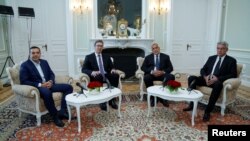The prime ministers of Bulgaria, Greece and Romania gave their support to their Balkan neighbor Serbia's bid to join the European Union on Tuesday, saying the integration of the western Balkans would guarantee regional peace and stability.
Serbia, which in the 1990s was seen as pariah of Western Balkans for its central role in wars that followed the collapse of Yugoslavia, expects to complete negotiations on EU membership by 2019.
"All of us know that the natural place of Serbia is in the European Union," Bulgarian Prime Minister Boyko Borissov said after a four-party summit in the Black Sea city of Varna with Greek Prime Minister Alexis Tsipras, Romanian Prime Minister Mihai Tudose and Serbian President Alexander Vucic.
Borissov said that the three EU members would work to speed up the process to the advantage of peace and stability in the Balkans and Europe generally.
Bulgaria takes over the rotating six-month EU presidency in January while Romania will take over in 2019.
Many Serbs, however, remain skeptical about joining the bloc and view Western European countries as outspoken advocates of the 1999 NATO bombing to halt the killing and expulsion of ethnic Albanians in the former province of Kosovo, in which thousands of civilians had been killed.
Double standards
Vucic accused the European Union of using double standards by refusing to accept the Catalan independence referendum while largely welcoming a separate Kosovo.
"We support Spain, it is our friendly country," said Vucic.
"But the European Commission responded in a different way [over Kosovo] and it was against my people and my state.
Kosovo's declaration of independence from Serbia in 2008 was accepted by Washington and most EU states, but rejected by Belgrade and its allies.
"Kosovo gained independence without even holding a referendum but Catalonia ... cannot get anything like that," Vucic said. "Sometimes, we, the Serbs, are asking ourselves why we should have been the victim of double standards?"
Serbia's position on Kosovo has been one of the main stumbling blocks in its own bid to join the European Union.
Brussels has said it needs to improve relations with the authorities in Pristina and stop trying to block their efforts to join international bodies.





